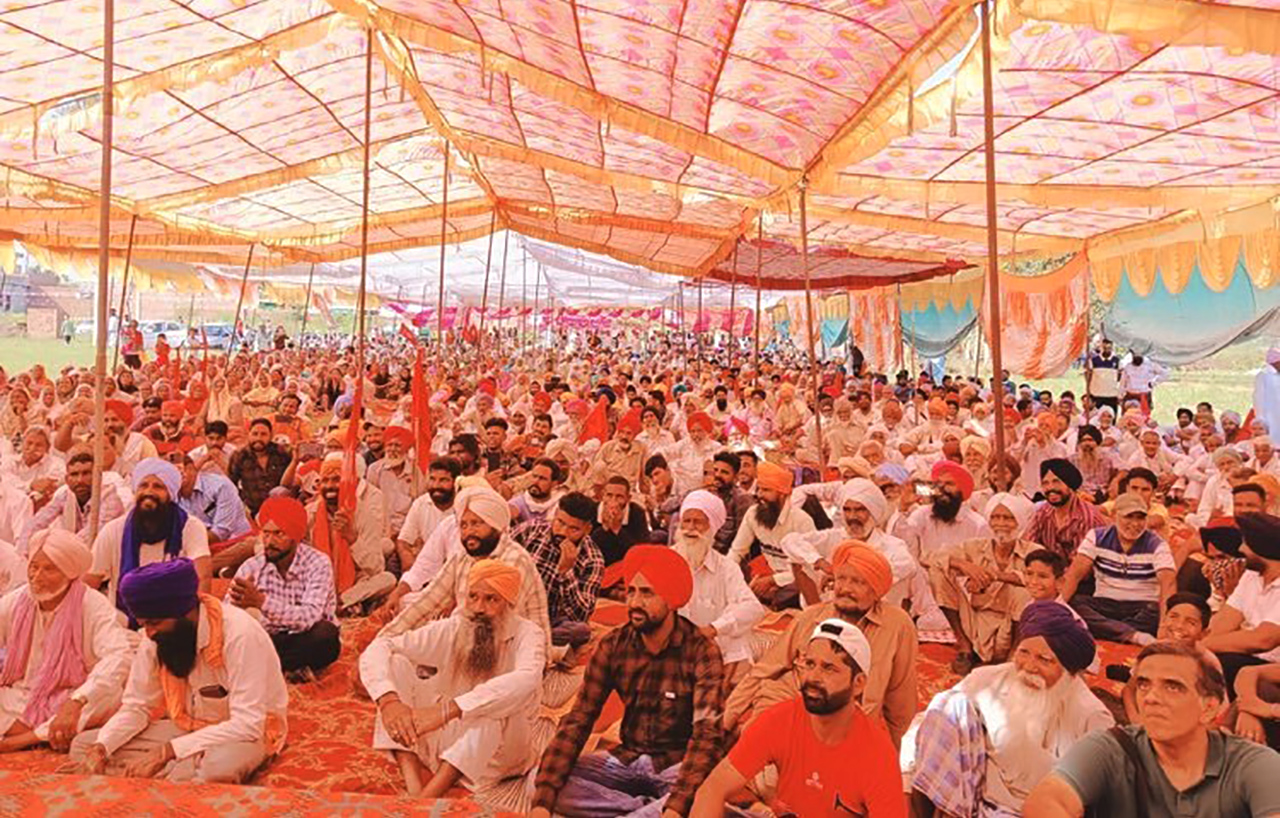A report on a recent conference of dalit agricultural labourers organised by the Zameen Prapti Sangharsh Committee (ZPSC) in Punjab by Harsh Thakor.
Democratic revolutionary spirit touched soaring heights in a conference organised by the Zameen Prapti Sangharsh Committee (ZPSC) on 28th September, in village Shadihari in Sangrur district of Punjab, with around 10,000 dalit agricultural labourers converging from all across Punjab. Spirit of resistance glowed on the faces of the participants’ workers. In no uncertain terms, the speakers condemned the non implementation of the Land Ceiling Act, and summed up how it was related to the anti-people agenda of the ruling classes as a whole. The conference was the culmination of meticulous preparations at grassroots level by ZPSC.
Possibly, one of the most impactful or successful conferences in organising dalit agricultural labour, to be staged in Punjab, reminiscent of a festival of the masses. It was the most commendable integration of students and youth activists with labourers. I felt privileged to participate in the event. The conference exhibited evidence of the escalating class consciousness and striking capacity of the dalit landless labour of Punjab.
Similar to days during the British Raj, even today in Punjab, the lands belonging to the Dalits and farm labourers are being grabbed by the rich and influential upper caste big farmers and others. One third of common panchayat land reserved for the dalits is scrupulously seized in auctions through dummy bids. The 34 percent dalit population living in Punjab is stripped of ownership rights of Nazul land in spite of the order from the High Court. Finance Secretary Bikar Singh Hathoa and Jagtar Singh Tolewal said that Punjab has the maximum landlessness of Dalits in India.
In the view of the report of the Planning Commission of the Central Government, if the land is fairly distributed among the landless and small farmers in Punjab under the provisions of the Land Ceiling Act, then several acres of land can be given to each such household. However, leaders of different political parties, bureaucrats and landlords have acquired this land through manipulation. At present dalit and small farmers do not have any meaningful employment.
The conference was a turning point in the land struggle in which thousands of workers from hundreds of villages from different districts of Punjab participated. Hundreds of village rallies, Jago, Jatha March, district and area level meetings were held, in preparation for the conference. The speakers vociferously condemned the attitude of administration over the land issue in Shadihari village and framing of ZPSC leaders through false FIRs.
ZPSC president Mukesh Mulaudh elaborated in detail how in reality the rulers broke all their promises to the landless agricultural labourers. He asserted that till now, the provisions of the Land Ceiling Act of Punjab have not been implemented. He exposed the lies of the ruling class intellectuals who profess that genuine land reform has already been done.
Bikar Singh Hathua narrated how all the ruling class parties connived in preserving the status quo of the establishment, and how in essence all of them opposed tooth and nail any genuine reforms for the dalit agricultural labourers.
Pendu Mazdoor Union President Tarsem Peter summarised the inter relationship between the economic and caste issues.
Kirti Kisan Youth President Bhupinder Longowal expressed the support of his organisation to the struggle for enforcement of the Land Ceiling Act.
Woman or Stree Mukti leader Aman Deol stressed on how it was an imperative task to mobilise women within the fold of the struggle, with women being the most victimised section, amongst the landless labourers.
Dharamveer Harigadh raised the issue, by naming a list of 20 persons, who were stripped of their land rights. He laid a condition for prompt action, in the absence of which a pukka (permanent) morcha (sit-in) would be staged. He also mentioned that if the 20 persons arrested in Mander village were not released, a major gherao would be organised at the SSP office.
The programme concluded with a play staged by Lok Kala Manch, founded by late playwright Gursharan Singh. It expounded the domination of feudal and casteist culture, and hegemony of upper caste landlord-mafias.
The success of the conference is a tribute to the diligent or intensive work of the organisation at the very base or block level, in confronting upper castes, and ensuring fair auctioning of common panchayat land in villages. Extricating the movement from mechanical reductionism on class lines or economic questions is an important achievement. The dalit community is confident in asserting their demands, with the conference manifesting their do or die spirit to fight at all costs and against all odds.
Just yesterday, we received welcoming news that 17 activists incarcerated and detained in village Manderwhile fighting for land rights of the dalit agricultural labourers and protesting fake land auctioning in the village, under section 307, have been released. It was a victory for the democratic movement. Celebrated . activists including Daljit Singh, Gurvinder Bina led the released activists to Ravidas Mandir in Mander village. Earlier a major protest was held in Patiala on August 25th, mobilising 1000 members of the SC community demanding their release.
Still it is a major challenge for the landless labourer organisations to neutralise or win over the landed Jat community to their side, or fuse together to build an united agrarian movement. The integration of the landed jat peasantry with the dalit labour was negligible in the conference. It is regrettable that no leaders participated in the event from other trends of the revolutionary camp in Punjab, like the Krantikari Pendu Mazdoor Union, Bhartiya KIsan Union factions and the Punjab Khet Mazdoor Union.
(Harsh Thakor is freelance journalist who attended the recent conference of the Zameen Prapti Sangharsh Committee.)

